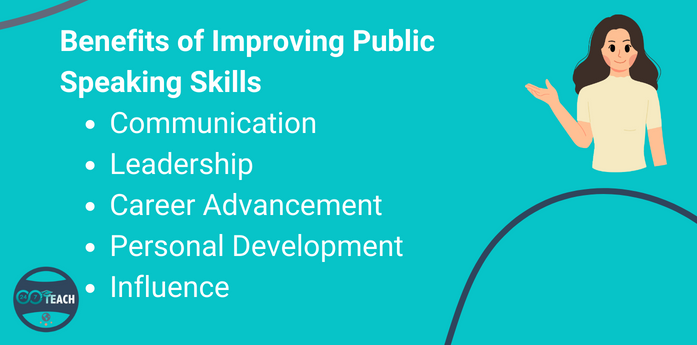Lesson 1: Understanding Public Speaking
Prefer to listen to this lesson? Click below:
Scenario
Imagine that your school has decided to cut funding for arts programs, including music, theater, and visual arts.
As someone passionate about the arts, you feel frustrated and upset by this decision.
You learn that the school board is meeting to discuss this decision and that everyone is invited.
You decide to write a speech that will change their minds, but you also realize that you must improve your public speaking skills to make the most significant impact.
You ask a trusted friend for help, and she recommends taking a short introductory public speaking workshop. In the workshop, you learn several techniques to effectively communicate your thoughts and how to inspire and influence others.
In this lesson: you will learn about public speaking, the different types, and the benefits of improving your public speaking skills.
As you read this lesson, think about your answer to this question: if you were a participant in a speaking competition and had to choose one speech type, which would you choose and why?
Lesson Objectives:
By the end of this lesson, learners will be able to…
Describe the purpose and style of each type of public speaking.
Explain the differences between informative, persuasive, entertaining, ceremonial, impromptu speaking, and debate.
Important Questions to Answer While Reading:
In order to be successful in this lesson, you must be able to answer these important questions.
In your own words, define public speaking.
What are the similarities between the different types of public speaking?
Summarize a few of the benefits of learning public speaking.
Pre-Assessment
Please complete the pre-assessment so that you can see your public speaking progress.
Definition of Public Speaking
Public speaking is delivering a speech or presentation to a live audience.
It involves effectively communicating a message or idea to a group, whether in a formal setting such as a conference or a more informal setting such as a community meeting.
Public speaking can take many forms, including speeches, presentations, debates, panel discussions, etc.
Public speaking aims to inform, persuade, entertain, or inspire the audience through effective communication and delivery.
Different Types of Public Speaking
There are several different types of public speaking, each with its own purpose and style. Here are some of the most common types:
Informative Speaking: Informative speaking is a type of speech that aims to educate or inform the audience about a particular topic. The speaker's primary goal in informative speaking is to provide accurate information to the audience without bias or personal opinion. The speaker should present facts, data, and other evidence-based information that can be verified. This type of speaking can include presentations, lectures, and demonstrations.
Persuasive Speaking: Persuasive speaking is designed to convince the audience to adopt a particular viewpoint or take action on a specific issue. The ultimate goal of persuasive speaking is to motivate the audience to take a particular action or adopt a particular point of view. The speaker must provide clear and actionable steps for the audience to put the argument into action.
Persuasive speaking involves using arguments, which are claims supported by evidence, to convince the audience to adopt a particular point of view or take a particular action. The speaker must use logic and reasoning to construct a compelling argument supported by evidence.
Entertaining Speaking: Entertaining speaking is a type of speech that aims to entertain the audience and create an enjoyable experience for them. The goal of entertaining speaking is to engage the audience's attention, hold their interest, and leave them entertained or amused. Whether you are presenting at a social event, giving a keynote speech at a conference, or delivering a talk at a comedy club, effective entertaining speaking can help engage your audience and leave them feeling entertained and satisfied.
Ceremonial Speaking: Ceremonial speaking is used in formal settings such as weddings, graduations, and funerals. This type of speaking aims to commemorate a specific event or occasion and honor or celebrate the people involved.
Impromptu Speaking: Impromptu speaking involves speaking on the spot without preparation. This type of speaking often occurs when a person is asked to speak unexpectedly, such as during a meeting or event.
Debate: A debate is a structured discussion between two or more people with opposing views. The goal is to persuade the audience to agree with your position on the debated topic.
Each type of public speaking requires a different approach and set of skills. Knowing your speech's purpose and audience will help you choose the most appropriate type of public speaking for your situation. You will learn more about how to find your speech audience and purpose in the next lesson.
Benefits of Improving Public Speaking Skills
Improving public speaking skills can have a wide range of benefits, including:
Communication: Public speaking skills are essential for effective communication. Whether you are speaking in front of a large audience, leading a team meeting, or just having a conversation with someone, being able to communicate clearly and persuasively is crucial.
Leadership: To be an effective leader, you must be able to inspire and motivate others. Public speaking skills are an important part of this, as they allow you to deliver powerful messages that can move people to action.
Career advancement: Public speaking skills can be a key factor in career advancement. Employers are often looking for individuals who can effectively communicate with clients, colleagues, and other stakeholders, and being able to give compelling presentations can set you apart from your peers.
Personal development: Developing your public speaking skills can also help with personal development. It can boost your confidence, improve your ability to think on your feet and help you overcome your fear of public speaking.
Influence: Public speaking skills are important for influencing others. Whether you are trying to persuade someone to see things from your point of view or to win support for a cause, speaking effectively is crucial.
Closing Assessment
Now that you have reached the end of this lesson, you should be able to answer the following:
In your own words, define public speaking.
What are the similarities between the different types of public speaking?
What aspects of public speaking make it an important part of your personal growth?
Discussion Question
Directions: Please answer the following question in the comment section below and interact with learners from around the world.
If you were a participant in a speaking competition and had to choose one speech type, which would you choose and why?
Please read and reply to other learners’ answers in the forum by stating if you agree or disagree with their answers and why. Your replies should offer new substantiated ideas or thoughtful questions.
Workshop created by Darcy Rice









